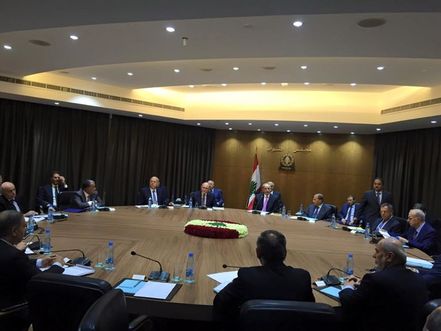 As was widely expected the Lebanese politicians failed again to produce any solutions to Lebanon’s political problems in the last day of the three-day national dialogue session
As was widely expected the Lebanese politicians failed again to produce any solutions to Lebanon’s political problems in the last day of the three-day national dialogue session
There was no agreement on the parliamentary electoral law
There was no agreement on the presidential election
They only agreed after a period of 27 years to establish a committee that would study the establishment of a senate, as stipulated in the Taif Accord and administrative decentralization
The Taif Accord which was established in 1989 stipulated that a senate would be established that would ensure that the rights of all various confessions are preserved and protected.
A statement issued by the press office of Speaker Nabih Berri said that attendees referred the administrative decentralization proposal to Parliament’s joint committee. The statement added that workshops will be held to pave the way for the establishment of a senate.
“The members of the national dialogue will have to provide Berri with the names of their representatives to the workshops ahead of Sept. 5,” when the next national dialogue sessions is scheduled to take place, according to the statement. “The workshop aims at drafting a law regarding the senate that will be referred to the relevant parliamentary committees for further study.”Former Interior Minister Ziad Baroud had previously authored a guide on how decentralization might take place. “[Phalange Party Head MP] Sami Gemayel will be proposing this guide to Parliament’s subcommittee,” Majdalani said.
Gemayel reportedly opposed all discussion over the establishment of a senate, insisting that the presidential crisis should be a priority.
“Studying new [political] reforms must happen in Parliament and nowhere else,” Gemayel said. “Shelving the new electoral law until a new senate [is agreed on] means extending the political vacuum.”
Gemayel repeated his call for the election of a president through a parliamentary vote, stressing that the election of a head of state and agreement on an electoral law should be top priority.
Commenting on the dialogue session , Shafiq Masri, constitutional expert and professor of international law at the American University of Beirut and the Lebanese American University in Beirut , he said , The proper legal sequence calls for holding presidential elections before the parliamentary”, pointing out that that there is a law in force ( the 1960th law) that should be used as the bases for the parliamentary election . He told the “Middle East”: “But the obstacle is not the law, that will be used as the basis of these elections, but how to form a new government if there is no president who will be in charge of the parliamentary consultations that lead to the appointment of a Prime Minister who will in turn form the government ?.”
Many of the top politicians were absent
Progressive Socialist Party Head MP Walid Jumblatt was represented by MP Ghazi Aridi
Marada Movement leader and presidential candidate Suleiman Frangieh did not attend
Free Patriotic Movement founder MP Michel Aoun was represented by his son-in-law Foreign Minister Gebran Bassil
Lebanese Forces Leader Samir Geagea also skipped the session because he considers the talks a waste of time
The Lebanese parliament failed again earlier last month and and for the 42nd time in a row to elect a president to replace Michel Suleiman whose term ended on May 25 , 2014.
As in the past sessions the parliament was unable to reach a quorum because the Iranian-backed Hezbollah militant group and its ally MP Michel Aoun’s Change and Reform bloc MPs boycotted the session, because they could not reportedly guarantee Aoun’s election as a president.
Amal Movement leader, Speaker Nabih Berri ( who hosts the dialogue sessions) postponed the election to August 8, 2016. But as in the preceding 42 sessions no one in Lebanon expects a president to be elected
Hezbollah and Iran , according to analysts do not want a president for Lebanon at this stage despite the fact that they have the votes to guarantee Aoun’s election.
Iran’s influence in Lebanon is at odds with all the countries supporting opposing political camps.

Leave a Reply
You must be logged in to post a comment.